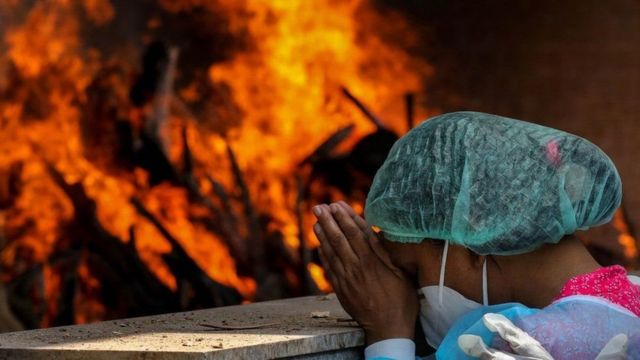The BBC News Russian Service app is available for IOS and Android . You can also subscribe to our Telegram channel.

image copyrightEPA
At the height of the pandemic in India, there were neither places nor human resources to bury the dead in accordance with all the rules, and they were simply burned in ritual fires.
According to updated data from the World Health Organization (WHO), almost 15 million people have died worldwide from the coronavirus pandemic, which is almost three times more than the official statistics that existed so far.
It was previously believed that about 5.4 million people died from covid. Even here, however, there were differences. For example, according to Johns Hopkins University, which many international media and experts relied on during the pandemic, the coronavirus claimed more than 6.2 million lives.
However, in any case, the new WHO data is many times higher than any of these figures. According to the experts of the organization, the official statistics of some countries were greatly underestimated – sometimes deliberately, and in most cases due to limited possibilities in the calculations.
For example, in India, according to WHO, 4.7 million died – ten times more than the official figures provided by the authorities. This country accounts for almost a third of all covid deaths in the world. In Russia, the official figures are three and a half times lower than the real ones .
Until now, the United States was considered the leader in terms of mortality, but according to the results of the latest study, India came out on top.
Delhi questioned the methodology for obtaining new data, provided additional information and asked WHO to wait with conclusions until the parties fully studied each other’s arguments.
WHO assured that it was open to dialogue, but confident in the conclusions of its study. In addition, they say in the organization, other expert groups dealing with this issue have come to similar conclusions.
The figure of 15 million deaths from covid is 13% higher than the average global death rate from any cause in two years.
The WHO emphasizes that 15 million are mostly those who died directly from the disease, although there is a percentage of those who suffered as a result of secondary causes – for example, they could not get to the hospital with another problem due to quarantine or lack of space and staff.
The WHO blames the chaotic and imperfect testing system at the very beginning of the pandemic for such a high death rate in part.
“This is a staggering number, and it is important for us to honor the memory of the dead, as well as to hold politicians accountable,” WHO expert Samira Asma said. “If we do not accurately calculate the number of deaths, we will miss the opportunity to better prepare for something like this in the future.”
In addition to India, a significant underestimation of mortality statistics has been established in Russia, Indonesia, the USA, Brazil, Mexico and Peru, the WHO says. In Russia, the number of deaths is three and a half times higher than official figures.
The WHO report also looks at excess mortality rates relative to the population of each country. In the UK, USA, Spain and Germany, this figure was higher than the global average for the period 2020-2021.
Among the countries with low excess mortality statistics are China, Australia, Japan and Norway.
China still adheres to the “zero covid” policy and continues the practice of mass testing of the population, quarantine and local lockdowns.
Australia has achieved satisfactory statistics due to the timely introduction of severe restrictions on entry into the country, according to WHO.
The authors of the report complain that they could not fully analyze the situation in Africa, since the data of 41 out of 54 countries of the African continent cannot be considered reliable and suitable as a basis for research.
“There is an urgent need to improve data collection systems. We cannot allow people to be born and die without leaving any trace, without a record of their departure. We must invest in registration systems to have accurate and timely information,” says Seattle University statistics professor John Wakefield.
To keep getting BBC news, subscribe to our channels:
Download our application:





